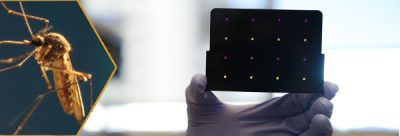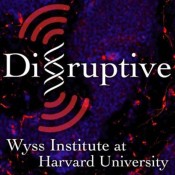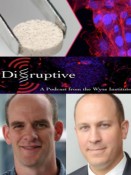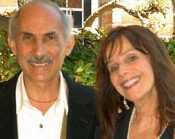Disruptive#6: Rapid, Low-cost, Paper-based Test for Zika
Written on June 24th, 2016McNally:
Hello, I’m Terrence McNally and you’re listening to Disruptive, the podcast from Harvard’s Wyss Institute for biologically inspired engineering. In early May, a low cost, rapid, paper-based diagnostic system for strain specific detection of the Zika virus was introduced by an international consortium of researchers led by synthetic biologist James Collins with the goal that it could soon be used in the field to screen blood, urine or saliva samples.
The core of the test kit is a piece of paper that changes color in the presence of Zika virus RNA and produces results in two to three hours. Much faster and cheaper than the PCR test used now according to Collins, a Wyss core faculty member – and it should cost less than a dollar per test adds University of Toronto biochemist Keith Pardee.
I’m going to speak with both of them about the real time story of a crisis
inciting innovation. How a team from a number of different institutions came together, and in a matter of six weeks developed a new approach to detection and designed a system to deploy in the face of future pandemics. Collins says, in response to an emerging outbreak, a custom tailored diagnostic system could be ready for use within one week’s time. We’ll explore how they did it, what they’ve learned and what this might mean for the future.
The mission of the Wyss Institute is to transform healthcare industry and the environment by emulating the way nature builds. Our bodies and all living systems accomplish tasks far more sophisticated and dynamic than any entity yet designed by humans. By emulating nature’s principles for self organizing and self regulating, Wyss researchers develop innovative engineering solutions for healthcare, energy, architecture, robotics and manufacturing.
In addition to leading the Living Cellular Devices and cellular devices platform at the Wyss, Jim Collins is the Termeer professor of medical engineering and science and professor of biological engineering at MIT. He’s a member of the Harvard MIT health sciences and technology faculty and an institute member of the Broad Instiute of MIT and Harvard.
Collins received a BA in physics from Holy Cross and a PHD in medical engineering from Oxford. A Rhodes Scholar, a MacArthur Fellow and a winner of the National Institutes of Health Directors Pioneer Award. Jim is one of the founders of synthetic biology as well as a pioneering researcher in systems biology and his engineering ranges from the physical scale of wearable medical devices to that of molecules.
Collins says he found early inspiration both in the space program and much closer to home.
Collins: [02:38]
I was born and grew up initially in New York City. My dad was an electrical engineer who had worked in the aviation industry so he did work for NASA, he did work for the military, he did work for a number of companies building planes. My mom was a math teacher.
Continue reading “Disruptive#6: Rapid, Low-cost, Paper-based Test for Zika”
Disruptive: Synthetic Biology Pamela Silver & George Church
Written on February 21st, 2016
I’m excited to offer the first episode of DISRUPTIVE, my new monthly podcast series produced with Harvard’s Wyss Institute for Biologically Inspired Engineering. The mission of the Wyss Institute is to: Transform healthcare, industry, and the environment by emulating the way nature builds, with a focus on technology development and its translation into products and therapies that will have an impact on the world in which we live. Their work is disruptive not only in terms of science but also in how they stretch the usual boundaries of academia.
In this inaugural episode, Wyss core faculty members Pamela Silver and George Church explain how, with today’s technology breakthroughs, modifications to an organism’s genome can be conducted more cheaply, efficiently, and effectively than ever before. Researchers are programming microbes to treat wastewater, generate electricity, manufacture jet fuel, create hemoglobin, and fabricate new drugs. What sounds like science fiction to most of us might be a reality in our lifetimes: the ability to build diagnostic tools that live within our bodies, find ways to eradicate malaria from mosquito lines, or possibly even make genetic improvements in humans that are passed down to future generations. Silver and Church discuss both the high-impact benefits of their work as well as their commitment to the prevention of unintended consequences in this new age of genetic engineering.
Disruptive: Cancer Vaccine & Hydrogel Drug Delivery
Written on December 5th, 2015Welcome to DISRUPTIVE the podcast from Harvard’s Wyss Institute for Biologically Inspired Engineering.
In this episode of DISRUPTIVE, we will focus on a cancer vaccine and hydrogel drug depots – both being developed by Wyss Founding Core Faculty Member, DAVE MOONEY. Mooney says the human immune system is the most efficient weapon on the planet to fight disease. Cancer, however, resists treatment and cure by evading the immune system. Unlike bacterial cells or viruses, cancer cells belong in the body, but are simply mutated and misplaced. Scientists have been trying to develop vaccines that provoke the immune system to recognize cancer cells as foreign and attack them. The approach developed by Mooney’s group, in which they reprogram immune cells from inside the body using implantable biomaterials, appears simpler and more effective than other cancer vaccines currently in clinical trials. In one study, 50% of mice treated with two doses of the vaccine — mice that would have otherwise died from melanoma within about 25 days — showed complete tumor regression. On a second front, when it comes to delivering drugs or protein-based therapeutics, doctors often give patients pills or inject the drug into their bloodstream. Both are inefficient methods for delivering effective doses to targeted tissues. Mooney and his team at Wyss are taking a new approach using biocompatible and biodegradable hydrogels. They’ve developed a gel-based sponge that can be molded to any shape, loaded with drugs or stem cells, compressed to a fraction of its size, and delivered via injection. Once inside the body, it pops back to its original shape, gradually releases its payload, and safely degrades. After we explore both of these exciting projects with Mooney, we take a closer look at the process of translation of hydrogel technology into products and therapies with Chris Gemmiti, a business development lead at Wyss.
Free Forum Q&A – JACK KORNFIELD & TRUDY GOODMAN A CELEBRATION of MINDFULNESS
Written on October 31st, 2015
On November 15, InsightLA, the leading Los Angeles-based Mindfulness Meditation organization, will host LIVING WITH A JOYFUL SPIRIT AND A WISE HEART, a day of deep teachings and timeless wisdom that will feature Trudy Goodman and Jack Cornfield in dialogue via video with a “who’s who” of the pioneers of mindfulness meditation in the West – Jon Kabat-Zinn (Wherever You Go, There You Are), Ram Dass (Be Here Now), Tara Brach (Radical Acceptance), Joseph Goldstein (Insight Meditatino), and Congressman Tim Ryan (A Mindful Nation). Both Trudy and Jack turn 70 this year. In the course of the conversation, we talk about their personal paths, what each of their guests means to them, and we tell the story of mindfulness in America over the last forty-five years.
Trudy Goodman has trained and practiced in two fields for over 25 years: meditation and psychotherapy. She studied developmental psychology with Jean Piaget, Lawrence Kohlberg, and Carol Gilligan, and for 20 years worked in a full psychotherapy practice. Since 1974, Trudy has devoted much of her life to practicing Buddhist meditation and teaching mindfulness. In 2002, Trudy founded InsightLA.
Jack Kornfield is a co-founder of the Insight Meditation Society in Barre, Massachusetts, and founding teacher of the Spirit Rock Center in Woodacre, California. His books have been translated into 20 languages and sold more than a million copies. They include, A Path with Heart; After the Ecstasy, the Laundry; Buddha’s Little Instruction Book; and A Wise Heart: A Guide to the Universal Teachings of Buddhist Psychology.
DISRUPTIVE: BIO-INSPIRED ROBOTICS features three separate interviews with (1) RADHIKA NAGPAL, (2) ROBERT WOOD, and (3) CONOR WALSH
Written on October 15th, 2015Welcome to the second episode of my new monthly podcast series produced with Harvard’s Wyss Institute for Biologically Inspired Engineering.
DISRUPTIVE: BIO-INSPIRED ROBOTICS features three separate interviews with (1) RADHIKA NAGPAL, (2) ROBERT WOOD, and (3) CONOR WALSH. From insects in your backyard, to creatures in the sea, to what you see in the mirror, engineers and scientists at Wyss are drawing inspiration to design a whole new class of smart robotic devices
In this one, CONOR WALSH discusses how a wearable robotic exosuit or soft robotic glove can assist people with mobility impairments, as well as how the goal to create real-world applications drives his research approach.
In part one, RADHIKA NAGPAL talks about her work Inspired by social insects and multicellular systems, including the TERMES robots for collective construction of 3D structures, and the KILOBOT thousand-robot swarm. She also speaks candidly about the challenges faced by women in the engineering and computer science fields.
In part two, ROBERT WOOD discusses new manufacturing techniques that are enabling popup and soft robots. His team’s ROBO-BEE is the first insect-sized winged robot to demonstrate controlled flight.
The mission of the Wyss Institute is to: Transform healthcare, industry, and the environment by emulating the way nature builds, with a focus on technology development and its translation into products and therapies that will have an impact on the world in which we live. Their work is disruptive not only in terms of science but also in how they stretch the usual boundaries of academia.
http://wyss.harvard.edu/
– See more at:
DISRUPTIVE: BIO-INSPIRED ROBOTICS Radhika Nagpal Interview
DISRUPTIVE: BIO-INSPIRED ROBOTICS Robert Wood Interview
Conor Walsh’s interview transcript
http://aworldthatjustmightwork.com/2015/07/auto-draft-18/





